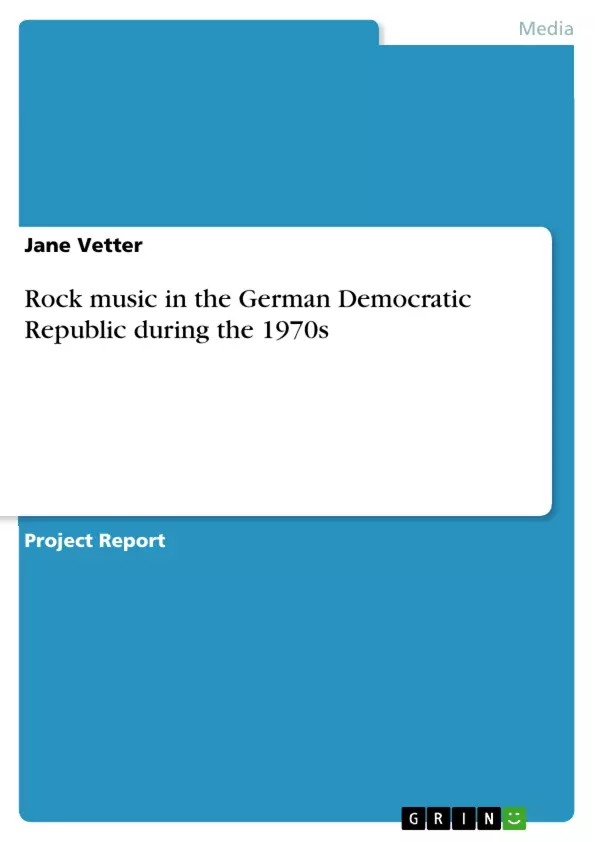Since the early 1950s, the East German leadership rejected the Anglo-American imperialist mass culture including its musical influences (Kirchenwitz 7). Western pop culture was seen as class enemy. Institutions monitored youth groups who met to listen to rock music and drank a lot of alcohol; this way of life was regarded as “decadent” and not exemplary. The majority of people rejected such teenage behavior since it offended values such as decency, order and tidiness (Maase 12-3). The problem of the youth was not necessarily the Nazi past of their parents, but the continuous dogmatism of parents, teachers and the ruling party in East Germany, the Socialist Unity Party of Germany (SED). This supported the development of a cultural milieu, which was against the ordinary beliefs of the political elite (Kirchenwitz 6). The following paper will cover these emerging subcultures during the 1970s in connection with musical influences coming from the West. It will identify popular East German bands and explain the conflict between youth interest and public claims. Furthermore, the essay will describe the overall setting of the German Democratic Republic in order to increase the value of comprehension and understanding in today’s totally different world and time.
Inhaltsverzeichnis (Table of Contents)
- Introduction
- East German Youth Culture
- Rock Music and the State
- The SED's Control over Music
- The Rise of Erich Honecker and the Music Scene
- The Repressive Nature of the GDR
Zielsetzung und Themenschwerpunkte (Objectives and Key Themes)
This research project examines the development of rock music in East Germany during the 1970s, exploring the tensions between state control and youth subculture. The paper will focus on identifying popular East German bands, analyzing the conflict between youth interests and public claims, and understanding the overall setting of the German Democratic Republic.- The impact of Western music on East German youth culture.
- The role of the Socialist Unity Party (SED) in shaping and controlling youth culture.
- The evolution of rock music in East Germany, including popular bands and musical styles.
- The struggle between youth expression and state suppression.
- The political and social climate of East Germany during the 1970s.
Zusammenfassung der Kapitel (Chapter Summaries)
- Introduction: This section sets the stage by outlining the context of the research project and provides background information on the East German government's rejection of Western pop culture.
- East German Youth Culture: This chapter delves into the complex relationship between the state and youth culture in East Germany. It explores the SED's attempts to control youth behavior and the emergence of subcultures that defied state guidelines.
- Rock Music and the State: This section examines the state's efforts to suppress rock music and its association with Western influences. It provides specific examples, such as the Beat revolt of 1965, and highlights the state's use of repression against individuals and bands.
- The SED's Control over Music: This chapter focuses on the SED's attempts to control and manipulate the music scene in East Germany. It analyzes the state's efforts to promote a specific "GDR style" and the use of spies and informants to suppress dissent.
- The Rise of Erich Honecker and the Music Scene: This section explores the changes in the East German music scene under Erich Honecker's leadership. It analyzes the state's attempts to regulate and control music while also providing greater access to cultural activities.
- The Repressive Nature of the GDR: This chapter highlights the state's repressive policies towards dissidents and musicians who challenged the political system. It discusses the denaturalization of Wolf Biermann and the suppression of legendary bands like the Klaus Renft Combo.
Schlüsselwörter (Keywords)
The key topics explored in this research project include East German youth culture, rock music, state control, Western influences, the Socialist Unity Party (SED), the Stasi, political repression, cultural suppression, and the cultural landscape of East Germany in the 1970s.Frequently Asked Questions
How did the GDR leadership view Western rock music?
The SED rejected it as "decadent" Anglo-American imperialist mass culture and a threat to socialist values.
What was the "Beat revolt" of 1965?
It was a youth protest in Leipzig after the state banned several beat bands, leading to a harsh crackdown by the police.
How did the Stasi control the music scene?
The Stasi used spies and informants to monitor bands and youth groups, suppressing any lyrics or behavior deemed anti-socialist.
Who were some legendary East German rock bands?
Bands like the Klaus Renft Combo were popular but often faced bans or repression because of their critical lyrics.
How did the music scene change under Erich Honecker?
Initially, there was a slight cultural opening in the 1970s, but the state soon returned to strict regulation and promotion of a specific "GDR style."
- Citar trabajo
- Jane Vetter (Autor), 2007, Rock music in the German Democratic Republic during the 1970s, Múnich, GRIN Verlag, https://www.grin.com/document/116466



